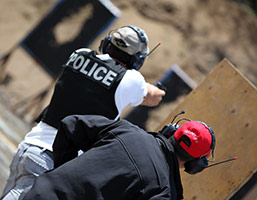The COPS Office defines training as the teaching and learning activities carried out for the primary purpose of helping members of an organization acquire and apply the knowledge, skills, abilities, and attitudes needed by a particular job or organization. Training is driven by specific goals and objectives; it is not a single event but rather an ongoing process that requires continuous self-reflection and evaluation.
TOPICS
The COPS Office has funded and developed several trainings in the following areas:
- Child & Youth Safety
- Community Policing
- Crime Prevention
- Homeland Security
- Leadership
- Legal Issues
- Officer Safety & Wellness
- Tribal Policing
For a complete list and description of online and in-person trainings please visit the COPS Office Training Portal.
TRAINING RESOURCES FOR GRANTEES
The following documents are for COPS Office grant and cooperative agreement recipients that are developing/delivering training and webinars:
Conference Requests and Reporting
- Conference and Event Approval, Planning, and Reporting FAQ
- DOJ Sponsored - Conference Request and Report Form (Excel Spreadsheet)
- Instructions for “Conference Request and Report” Form
Guides/Manuals
- COPS Office Logo Standards Manual
- In Person Curriculum Standards Guide
- Instructor Quality Assurance Guide
- On-Demand Online Curriculum Process Guide
- Video Development Process Guide
Fact Sheets
- ADDIE Fact Sheet
- Training Fact Sheet
- COPS Office Logo Guideline Fact Sheet
- Marketing Guidelines Fact Sheet
- Online Training Development Technical Overview
- Webinar Fact Sheet
Templates
- Course Design Document Template
- Instructor Guide Template
- Participant Guide Template
- PowerPoint Background
- TOT Instructor Guide Templates
- TOT Participant Guide Template
- COPS TOT PowerPoint Background
- COPS Training PowerPoint Background
- Webinar Template
The following Other Government Resource is available for grantees:
PREPARING FOR ACTIVE SHOOTER SITUATIONS
 The Advanced Law Enforcement Rapid Response Training (ALERRT) Center at Texas State University provides, on behalf of the COPS Office, the Active Attack Integrated Response (AAIR) Course. The two day course is designed to improve integration between law enforcement, fire, tele-communicator and emergency medical services (EMS) in active attack / shooter events. The course has been designed to improve the safety and survivability of victims of active attack / shooter events and increase the effectiveness, coordination, and resource integration between law enforcement, fire, tele-communications and EMS when responding to these events. In addition to the training course, ALERRT offers a train the trainer program on the AAIR course. This forty (40) hour class yields certified instructors who supported with the materials and equipment they need to conduct classes in their regions.
The Advanced Law Enforcement Rapid Response Training (ALERRT) Center at Texas State University provides, on behalf of the COPS Office, the Active Attack Integrated Response (AAIR) Course. The two day course is designed to improve integration between law enforcement, fire, tele-communicator and emergency medical services (EMS) in active attack / shooter events. The course has been designed to improve the safety and survivability of victims of active attack / shooter events and increase the effectiveness, coordination, and resource integration between law enforcement, fire, tele-communications and EMS when responding to these events. In addition to the training course, ALERRT offers a train the trainer program on the AAIR course. This forty (40) hour class yields certified instructors who supported with the materials and equipment they need to conduct classes in their regions.
For further information on AAIR or AAIR Train-the-Trainer please click here.
To register for a course please contact your ALERRT Regional Manager found here.
TRAINING REFERS TO:
- The teaching & learning activities that help members of an organization acquire and apply necessary knowledge, skills, abilities, and attitudes;
- Driven by specific goals, outcomes, and objectives;
- An ongoing process; it is not a single event; and
- Requires continuous self–reflection and evaluation.
Access the complete library of the COPS Office publications at the Resource Center.
 Official websites use.gov
Official websites use.gov Secure .gov websites use HTTPS
Secure .gov websites use HTTPS 














